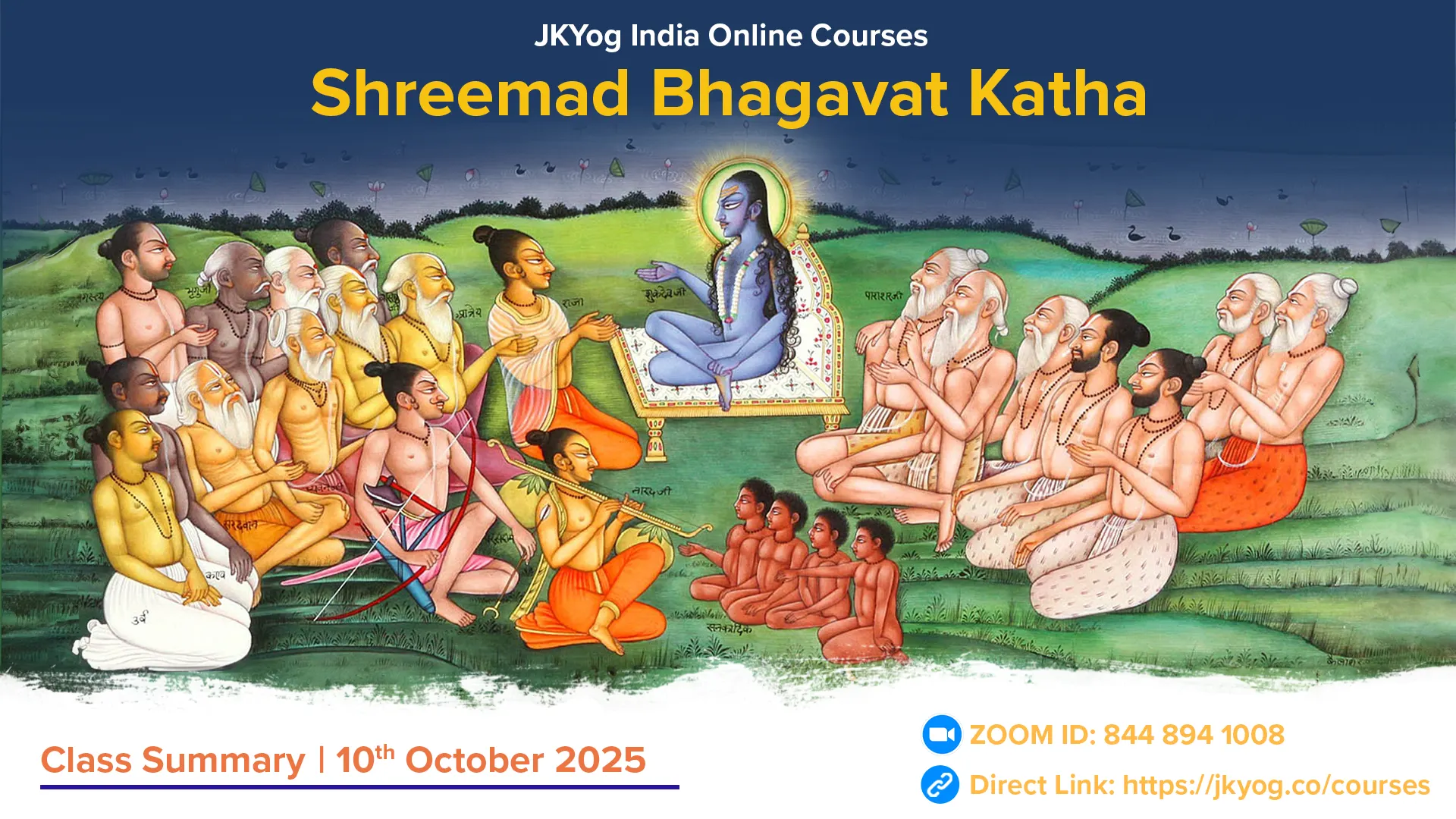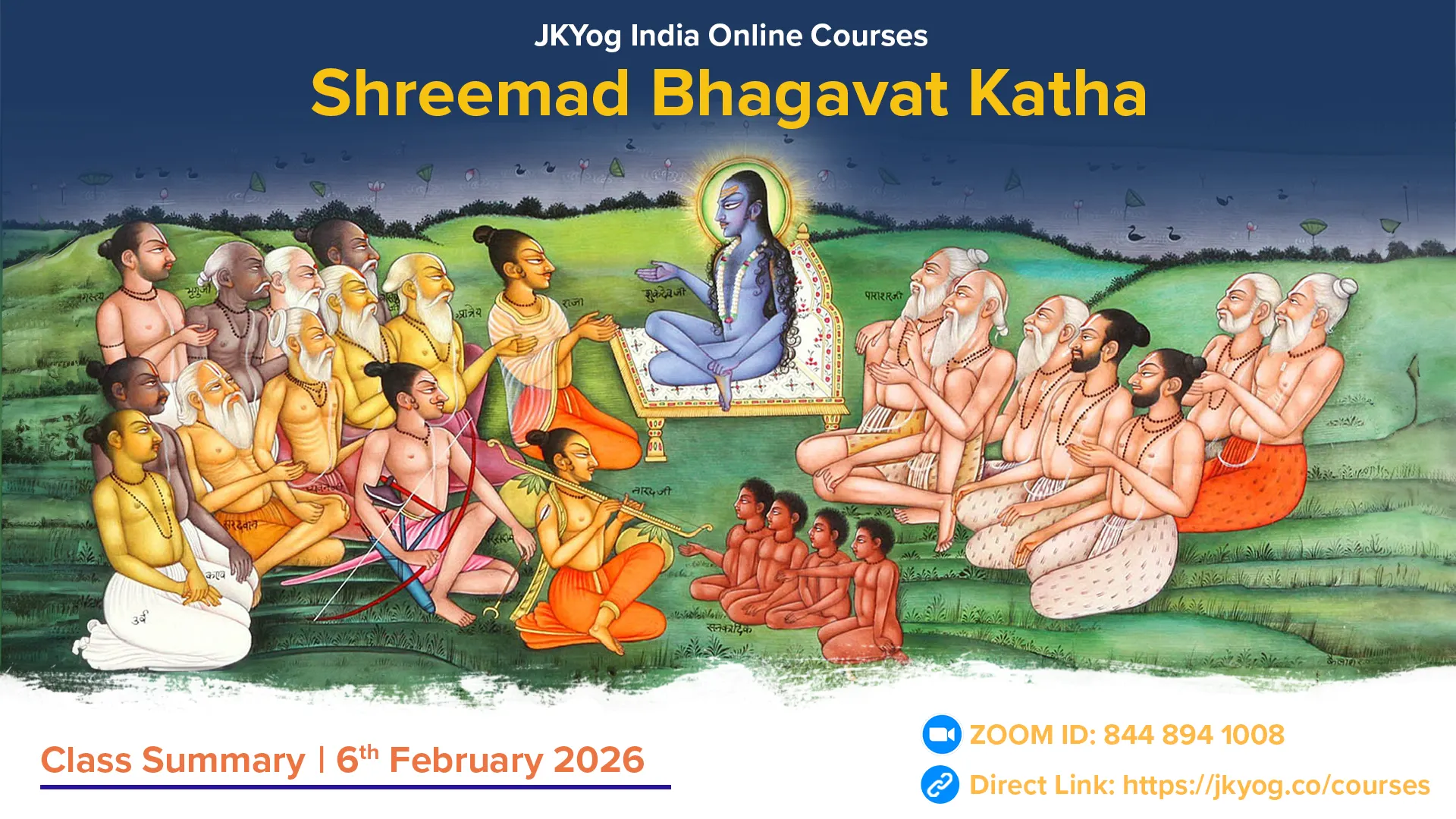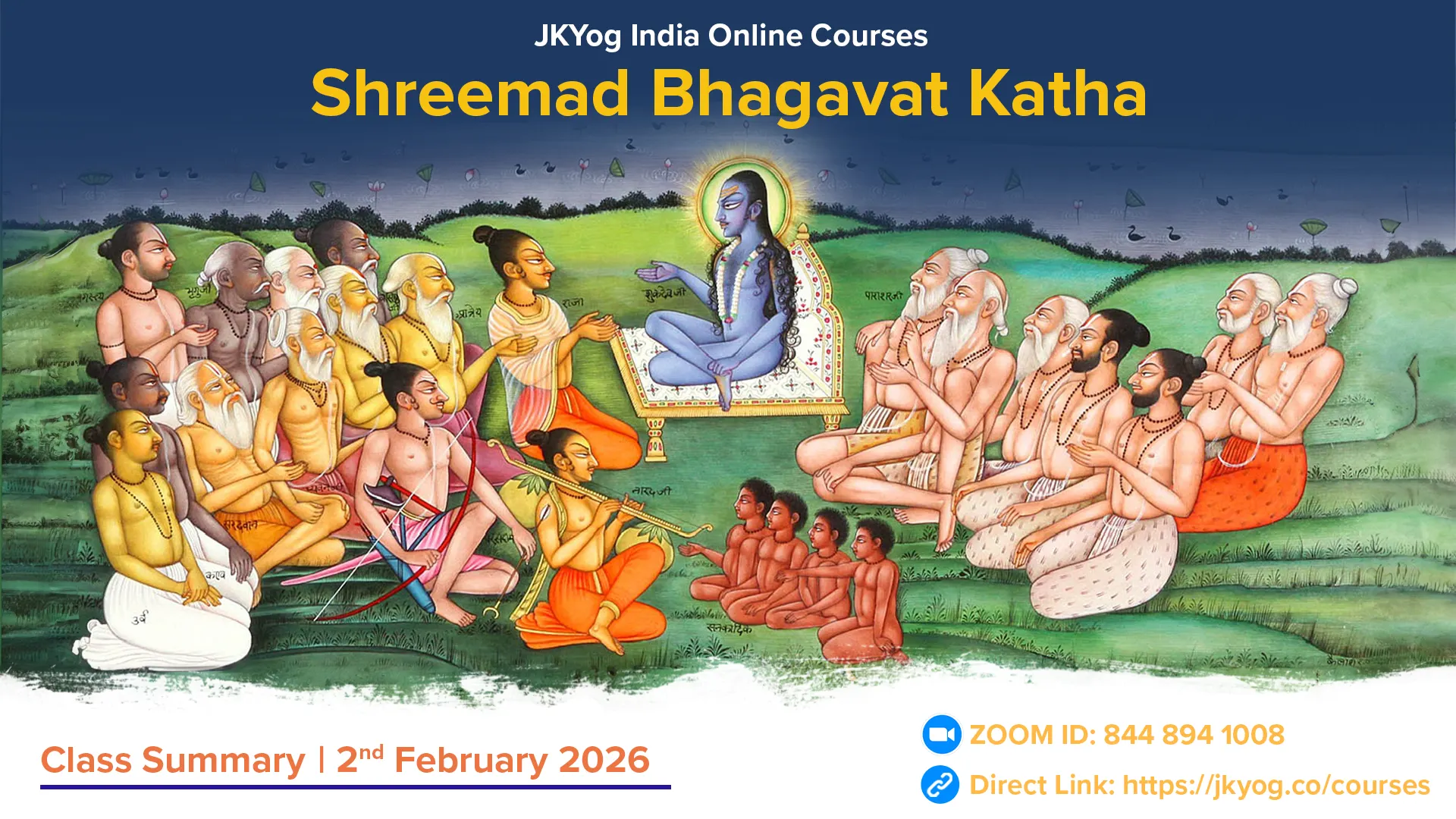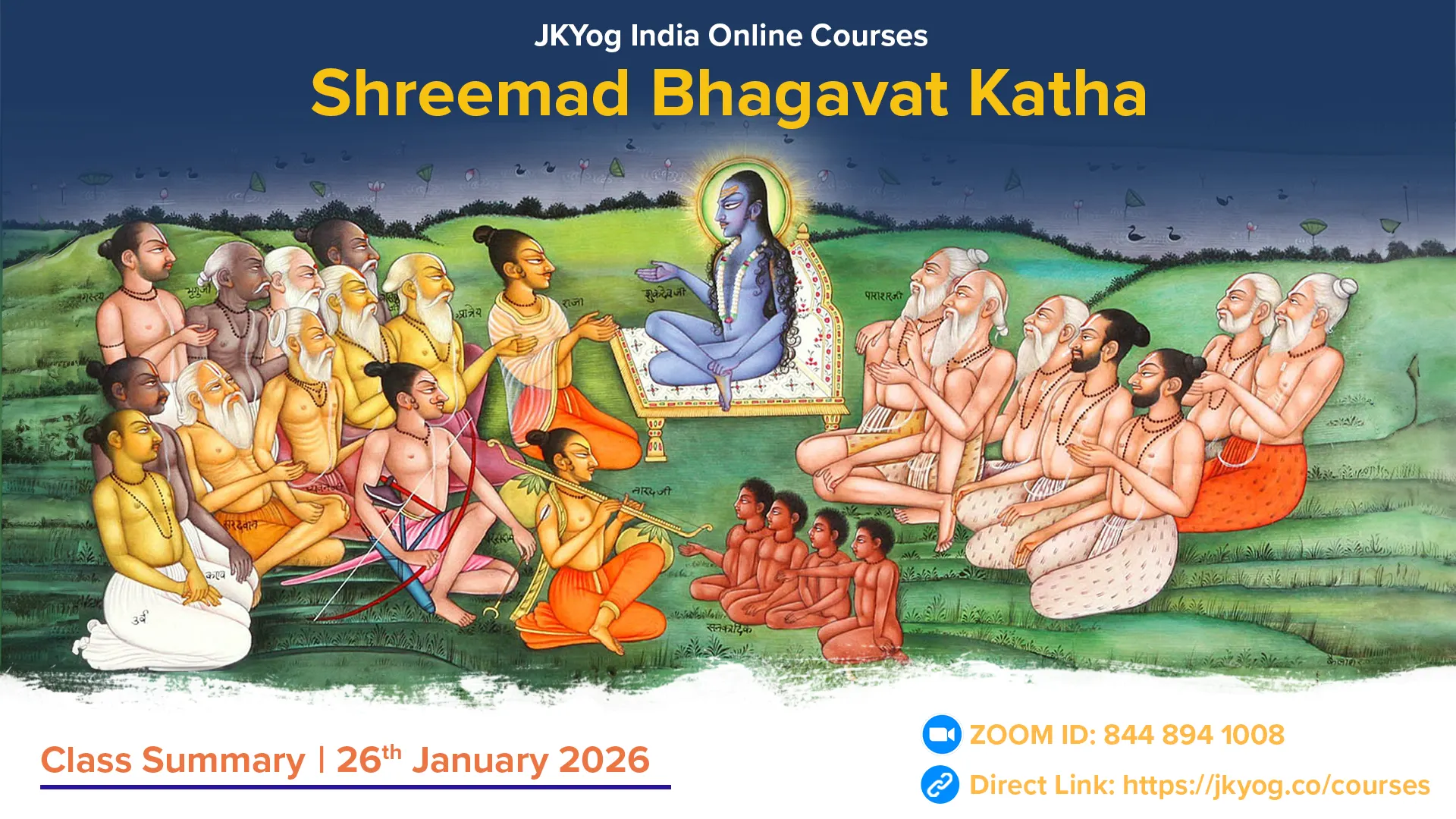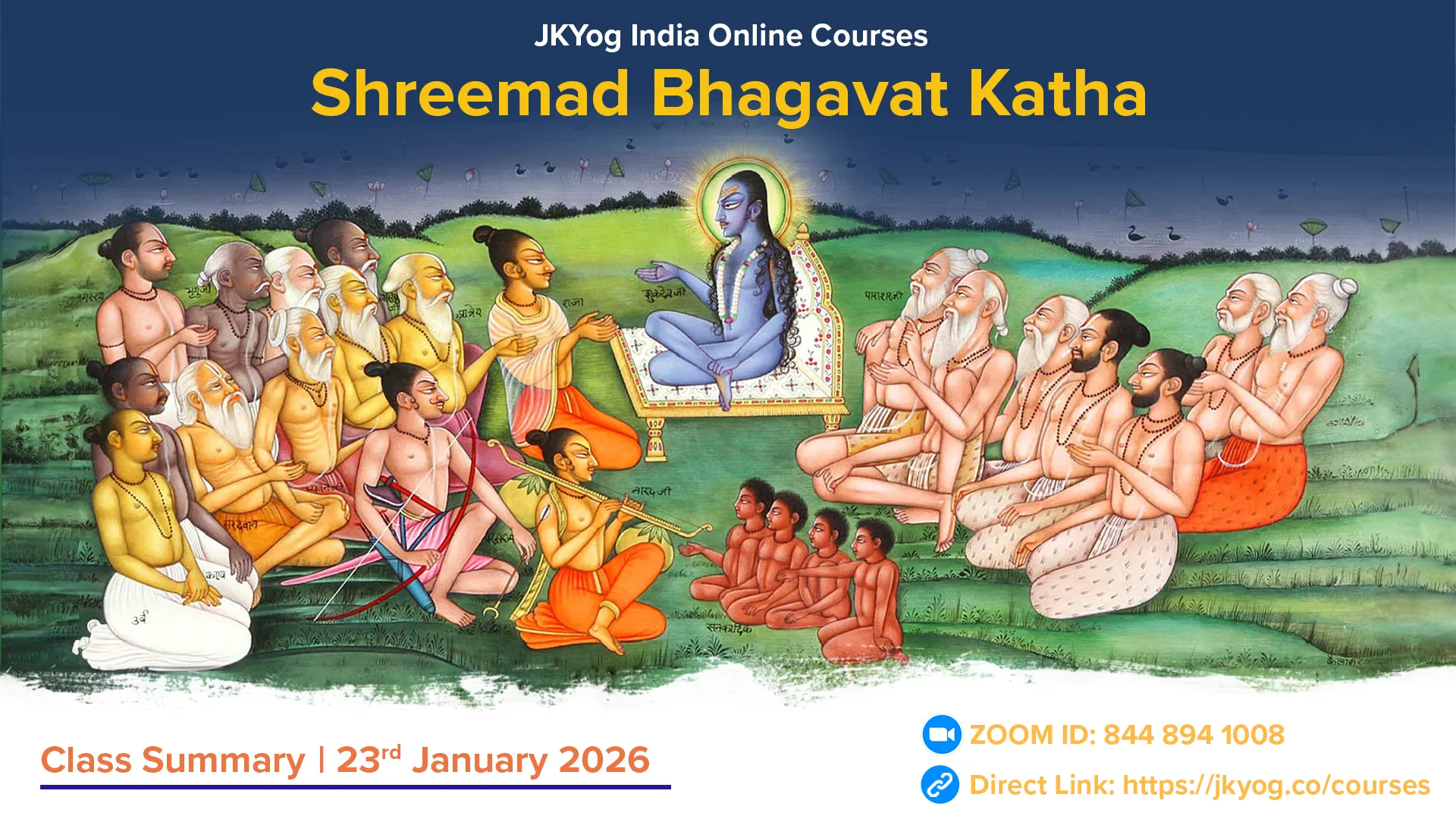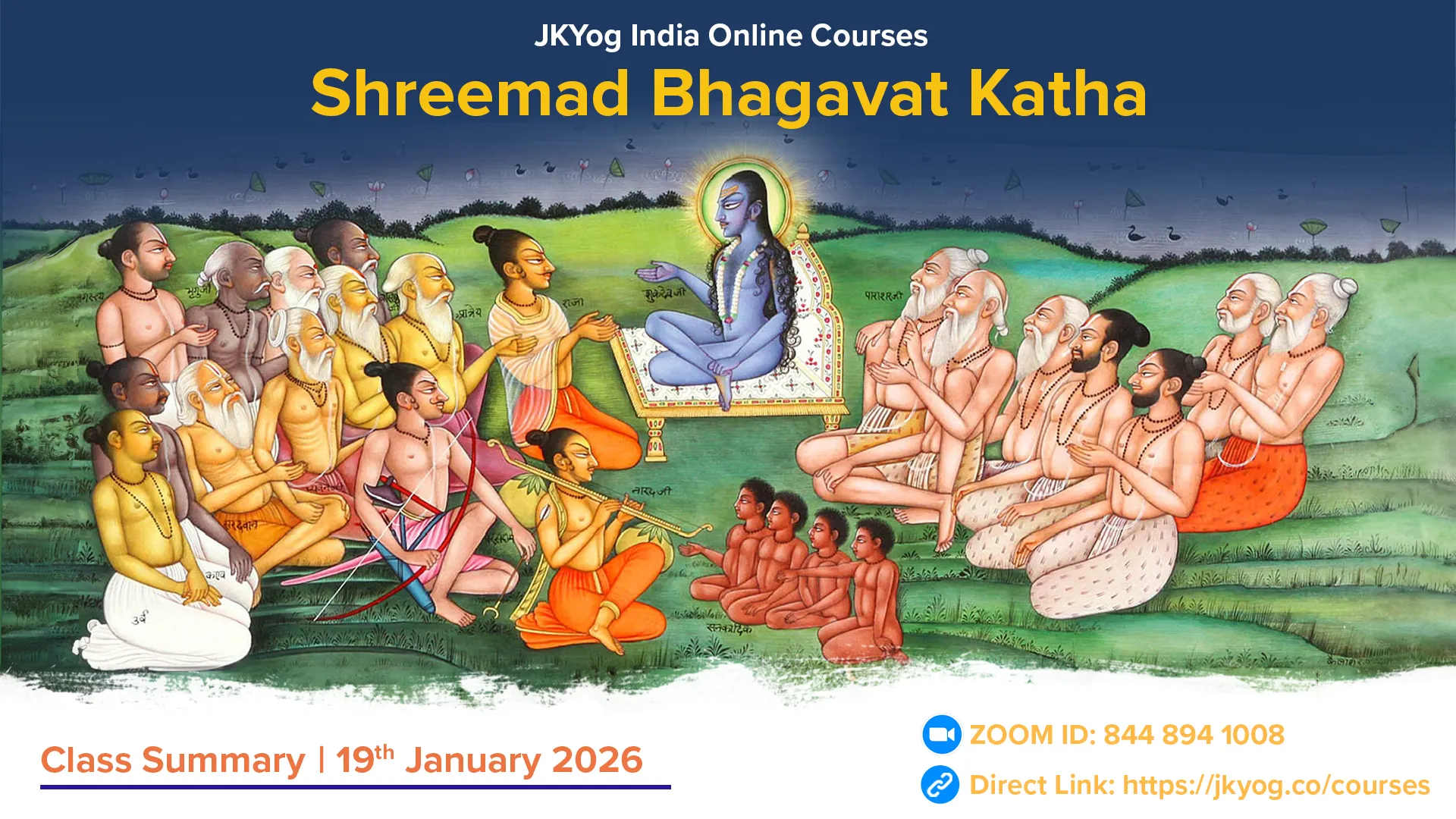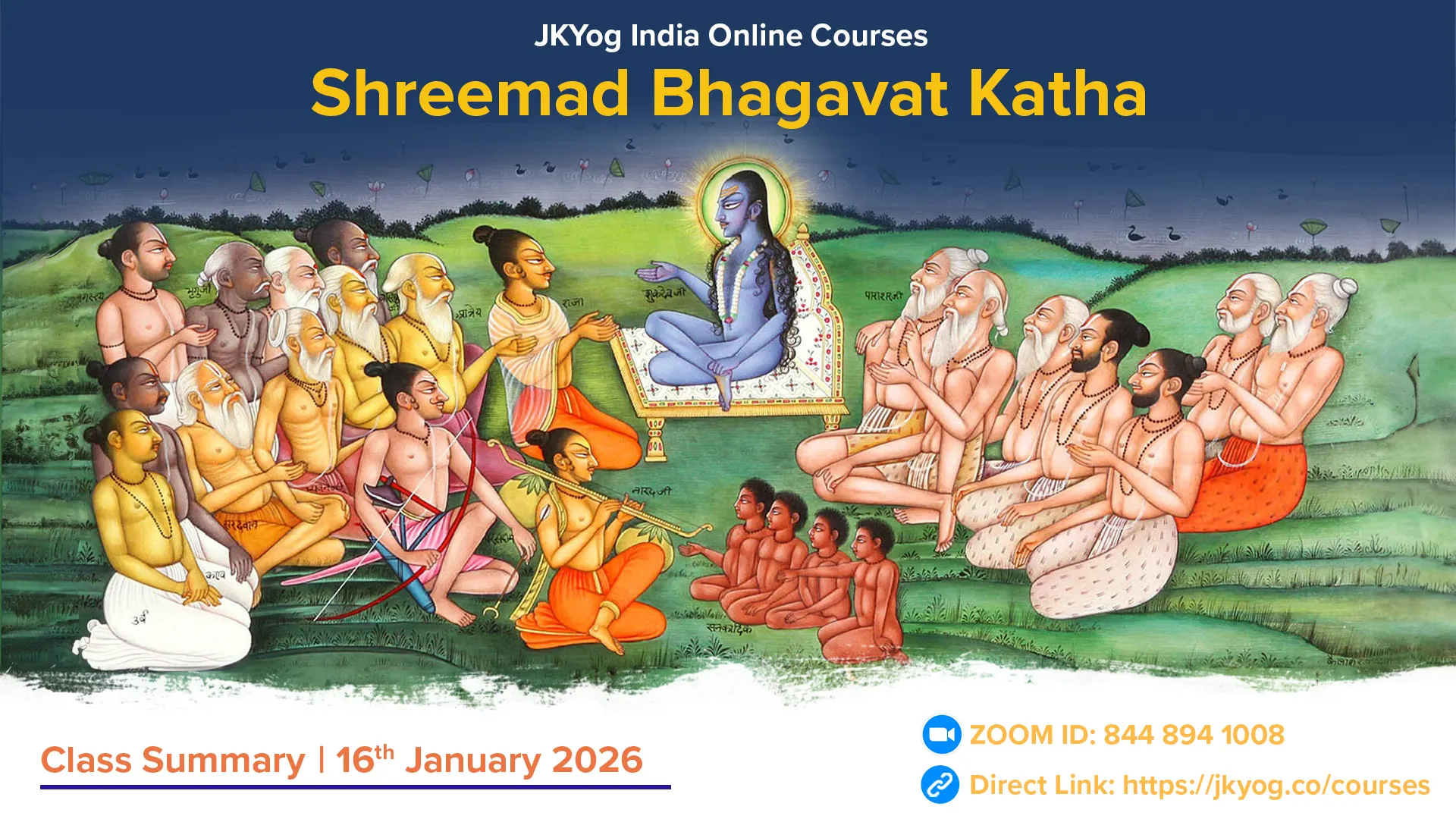Shreemad Bhagavat Mahapuran- Canto: 10, Chapters: 1&2
King Parikshit, standing at the doorstep of death, asked only one question to Shukdevji, “O great sage! Please be gracious and narrate to me the sacred, sweet, and liberation-bestowing pastimes of Shree Krishna, who descended in the Yadu dynasty.
The glories of Bhagwan, which even liberated saints sing with love, serve as the divine medicine that cures the disease of material existence for seekers of liberation, and as a source of joy and delight for common listeners, only a self-destructive person would turn away from such divine narrations of Shree Krishna.
My Kuldevata (family deity), Shree Krishna, protected the Pandavas during the Mahabharat war. The Kaurav army, vast as the ocean, was impossible to cross, yet my grandfathers easily crossed it by taking refuge in Shree Krishna’s lotus feet.
When I was being burned in my mother’s womb by the Brahmastra of Ashwatthama, my mother took refuge in Shree Krishna. He entered her womb, bearing His divine discus, and protected me. Within, He exists as the soul who grants immortality, and externally, He is the Lord of Death Himself. His appearing in a human form is merely His divine play (Leela).
Now, please tell me:
- How was it that Balaramji became the son of two mothers at the same time?
- Why did Shree Krishna leave His loving parents and go to Vraj?
- What divine pastimes did He perform in Vraj and in Mathura?
- Why did He slay His uncle Kansa?
- How many years did He reside in Dwaraka, and how many wives did He have?”
Hearing such beautiful and heartfelt questions, Shukdevji said with great joy, “O King! Your question is supremely auspicious. By inquiring, narrating, and listening to the divine pastimes of Shree Krishna, the questioner, the speaker, and the listener all three become purified, just as one is purified by the holy waters of the Ganga or the charanamrit (sanctified water) of Bhagwan Shaligram.”
At that time, unrighteousness had spread across the earth. Countless daityas (demons) had incarnated as arrogant kings and were tormenting the world. Burdened by their cruelty, the Earth, in the form of a cow, became weak and emaciated, tears streaming from her eyes, lowing in grief, and went to seek refuge in Brahmaji, pouring out her sorrow.
Moved with compassion, Brahmaji listened to her and took her along with Bhagwan Shankar and other devas to the shore of the Kshirsagar (Ocean of Milk). There, all the devas offered prayers to the Supreme God through the Purush Sukt. While praying, Brahmaji entered deep meditation and heard a divine voice from the heavens.
Brahmaji then told the devas: “God is already aware of the Earth’s suffering. He is the Supreme among all gods. By His divine power of Time, He will soon descend to relieve the burden of the Earth. You all should also take birth in the Yadu dynasty along with your divine portions to assist in His divine pastimes.
The Supreme Person, Bhagwan Purushottam Himself, will appear in the house of Vasudevji. To serve Him and His beloved Shree Radha, celestial maidens will also take birth on Earth. Anant Shesh Bhagwan will appear first as His elder brother, Balaramji. Yogmaya too will descend on His command to play her destined role.”
Saying this, Brahmaji consoled the Earth and returned to His celestial abode.
Who became who during Bhagwan Krishna’s Avatar
- Kashyapji was born as Vasudev.
- Aditi Devi became Devaki.
- Kalanemi became Kans.
- The Vasu named Pran took birth as Shurasen.
- The Vasu named Dhruv became Devak.
- The Vasu named Vasu himself became Uddhav.
- Daksha Prajapati was born as Akrur.
- Varun deva became Kritavarma.
- The Marut devata took birth as Ugrasen.
- King Ambarish became Yuyudhan.
- The great devotee Prahlad appeared as Satyaki.
Who were the Gopis of Vraj in their previous births?
The Gopis of Vraj were not ordinary women they were divine beings from various celestial realms:
- The companions of Rama Devi of Vaikuntha.
- The sakhis of Shwet Dweep (the divine white island).
- The goddesses of Urdhva Vaikuntha, attendants of Bhagwan Ajit’s lotus feet.
- The companions of Lakshmi, who reside on Shreelokachal mountain, born from the ocean.
- The celestial maidens of the heavenly worlds (Dyulok) who once had darshan of Bhagwan Yajna.
- The women of Jalandhar city, who worshipped Bhagwan Hari after seeing Him.
- The daughters of the ocean, who beheld Bhagwan’s Matsya Avatar.
- The women of Barhishmati city, who were enchanted by King Prithu.
- The apsaras of Gandhamadan mountain, who had once gone to tempt Rishi Narayan.
- The women of Sutal Lok, who had worshipped Vaman Bhagwan.
- The daughters of the serpent king (Nagaraj), who had worshipped Shesh Avatar.
- The verses of the Vedas (Vedic hymns personified).
- The women of Mithila from Ram Avatar, and the sages of Dandaka forest who had longed for Bhagwan’s divine embrace.
Even the herbs and medicinal plants who performed austerities after Dhanvantari disappeared were reborn in Vrindavan as creeper-like Gopis (Lata Gopis), constantly embracing Shree Krishna through their tender vines.
Vasudevji’s Promise to Protect Devaki
In the Yadu-lineage king Shurasen ruled from Mathura. From his reign onwards, Mathura became the capital of the Yadus, where Bhagwan Shreehari eternally resided.
Shurasen’s son, Vasudevji, married Devakiji’s daughter, Devaki. After the wedding, when Vasudevji was returning home with his new bride in a chariot, Devaki’s cousin, Kansa the son of Ugrasen joyfully took hold of the reins and began to drive the chariot himself. Hundreds of golden chariots followed behind in the procession.
At the time of departure, Devak had given his beloved daughter an enormous dowry, four hundred elephants, fifteen thousand horses, eighteen hundred chariots, beautifully adorned maidservants, golden necklaces, and various ornaments and garments. Throughout Mathura, conch shells, mridangams, kettledrums, and trumpets resounded together, filling the city with an auspicious and festive atmosphere.
During this joyous journey, a celestial voice suddenly echoed from the sky, “O foolish Kansa! The eighth child born of Devaki will be your slayer!”
Kansa was a sinful and wicked man cruel, shameless, and the disgrace of his lineage. Hearing the divine prophecy, he immediately drew his sword and seized his sister Devaki by the hair, preparing to kill her on the spot.
At that moment, the noble Vasudevji, calm and wise, stepped forward and tried to stop him with gentle, reasoning words.
He said, “O Prince! You are the illustrious descendant of the Bhoja dynasty, one who upholds the honour of your family. Great heroes sing your praises. In front of you stands a woman, your own sister, and this is a sacred wedding occasion. How can such an act of violence be fitting for you?
Brave one, whoever is born must surely die, whether today or a hundred years later. When the body perishes, the soul takes another body according to its karma. This is the unchangeable law of nature. Therefore, a wise man, desiring his own welfare, should never harbour hatred or enmity toward anyone.
Kansa, she is your younger sister, newly married, with the auspicious marks of marriage still fresh on her body. She is innocent and helpless. A noble and compassionate man like you should not kill such a blameless woman.”
Shukdevji further says that Vasudevji first tried to pacify Kansa with praise and soft words, and then appealed to his fear and logic. But Kansa, having developed a demonic nature, remained stubborn and unmoved.
Seeing his obstinacy, Vasudevji thought to himself, “I must somehow avert this crisis for now. A wise man should, to the best of his understanding and ability, make every effort to postpone death. If, even after trying, death cannot be averted, then no fault lies in that.
So, I will promise Kansa that I will hand over to him every child born of Devaki. This will save Devaki’s life for the moment. What happens later is in the hands of destiny. Perhaps, in the future, one of my sons will indeed be the cause of Kansa’s death. Who can alter Bhagwan’s divine will? Sometimes even imminent death is delayed, and sometimes what is delayed returns unexpectedly.”
Having resolved thus, Vasudevji carefully and respectfully praised the sinful Kansa. Though his heart was heavy with pain, he maintained a calm face and a gentle smile, saying, “O gracious one! You need not fear Devaki herself, as the akashvani declared. The danger lies not in her but in her future children. Therefore, I promise that whenever she bears a child, I will personally bring and hand the child over to you.”
Kansa knew that Vasudevji was a man of truth and wisdom. Finding his words logical and reassuring, he abandoned his plan to kill his sister.
Vasudevji felt deeply relieved and returned home safely with Devaki, grateful that her life had been spared, at least for the time being.
Kansa’s Atrocities, the Imprisonment of Devaki and Vasudevji, and the Killing of Their Sons
Devaki was a chaste and virtuous woman, a sati-sadhvi in the truest sense. The divine powers of all devas resided within her body. In due course of time, one after another, she gave birth to eight sons and one daughter.
The first child was named Kirtiman. True to his promise, Vasudevji took the newborn to Kansa. Though his heart was heavy with sorrow, Vasudevji considered keeping his word to be the highest form of Dharma.
Those who are steadfast in truth endure even the greatest pain; the wise remain free from expectations; the wicked can go to any extent in evil; and the self-controlled can renounce everything for righteousness.
When Kansa saw that Vasudevji was equally detached toward life and death and was completely devoted to truth, he laughed and said, “Vasudev, take this child back. I have no fear of him. The akashvani said that only Devaki’s eighth son will be the cause of my death.”
Vasudevji agreed, took the baby back, and returned home but remained cautious. He knew that Kansa was evil and could change his mind at any moment. Hence, he did not trust his words.
At that time, Naradji came to Kansa and said, “Kansa! The cowherds of Vraj like Nand, their wives, Vasudev and the Yadus, Devaki and the Yadav women; all of them are, in truth, devas in human form. The relatives of Nand and Vasudev, those serving you at this very moment are devas. The earth has become burdened by the weight of daityas, and the devas have begun preparations for their destruction.”
Hearing this, Kansa became fully convinced that the Yadavas were indeed divine beings, and that Bhagwan Vishnu Himself would be born from Devaki’s womb to kill him.
Driven by this fear, Kansa imprisoned Devaki and Vasudevji, shackling them with chains and iron fetters. From then on, every time Devaki gave birth to a child, Kansa mercilessly killed the newborn, one after another, haunted by the constant fear that Vishnu might have appeared in the form of that infant.
It has often been seen in the world that greedy and ruthless kings, blinded by self-interest, have not hesitated to kill their own parents, brothers, or well-wishing friends. Kansa was one such tyrant. He also remembered that in his previous birth he had been the asura Kalanemi, slain by Bhagwan Vishnu Himself. Hence, he bore an intense enmity toward the Yadavas.
In his hatred, Kansa imprisoned his own father, King Ugrasen, the ruler of the Yadu, Bhoja, and Andhaka clans, and usurped the throne of Mathura for himself.
Shukdevji narrated to King Parikshit that Kansa was immensely powerful. Moreover, he had the strong alliance of Jarasandh, the mighty king of Magadh. Several fierce asuras also stood by him like Pralambasur, Bakasur, Chanur, Trinavart, Aghasur, Mushtik, Arishtasur, Dvivida, Putana, Kesi, Dhenukasur, and even Banasur and Bhaumasur, the great demon kings.
With all of them as his allies, Kansa launched a campaign to destroy the Yadavas. Terrified by his growing tyranny, the Yadavas fled to various kingdoms- Kuru, Panchal, Kekaya, Shalva, Vidarbha, Nishadha, Videha, and Kosala and settled there. Some remained outwardly loyal to Kansa and served him, only to avoid his suspicion and ensure their survival.
The Birth of Balramji and Bhagwan Krishna’s Command to Yogmaya
During that time, when Kansa had killed six of Devaki’s sons one after another, Sheshji (Anant), a divine expansion of Bhagwan, entered Devaki’s womb as her seventh child. Sheshji was the embodiment of eternal bliss, and so Devaki naturally felt great joy within her heart. Yet, along with that joy came a deep fear she dreaded that Kansa might again destroy this child, too.
When Bhagwan Vishnu saw that the Yadavas, who considered Him their very life and soul, were suffering greatly under Kansa’s tyranny, He decided to act. He summoned His divine power, Yogmaya, and said to her, “O Devi! O auspicious one! Go to Braja, that beautiful land adorned with cows and cowherds. In the Gokul of Nandbaba, Rohini, the wife of Vasudev, resides there out of fear of Kansa, Vasudev’s other wives are also hiding in secret places.
At this moment, My partial expansion, Shesh, is present in Devaki’s womb. You must transfer him from Devaki’s womb into the womb of Rohini. Soon, I Myself will descend as Devaki’s son, endowed with all My divine knowledge, strength, and majesty.
You, Yogmaya, will take birth in Gokul from the womb of Yashoda, the wife of Nandbaba. You shall be worshipped by people who will see you as the fulfiller of all desires. They will offer you incense, lamps, food offerings, and many kinds of worship materials. On Earth, countless temples will be dedicated to you, and you will be known by many names like Durga, Bhadrakali, Vijaya, Vaishnavi, Kumuda, Chandika, Krishna, Madhavi, Kanya, Maya, Narayani, Ishani, Sharada, Ambika, and many others.”
Obeying Bhagwan’s divine command, Yogmaya gently removed Sheshji from Devaki’s womb and placed Him in Rohini’s womb. For this reason, He became known as Sankarshan (the one who was “drawn out”). Since He delighted the hearts of all beings, He was called Ram, and because He was the most powerful among the strong, He was renowned as Balabhadra.
When Bhagwan gave this command, Yogmaya bowed to Him with folded hands, saying, “As You wish,” circumambulated Him with reverence, and descended to the earthly realm to carry out His order exactly as instructed.
When Yogmaya transferred the embryo from Devaki to Rohini, the people of Mathura were unaware of the divine act. Seeing Devaki’s womb appear empty, they pitied her and whispered among themselves, “Alas! Poor Devaki her pregnancy has again been lost.”
Bhagavan api vishvatma bhaktanam abhayaṅkarah
avivesh amshabhagena mana anakadundubheh
Bhagwan is the giver of fearlessness to His devotees. He is present everywhere, in every form, and therefore, He has no need to come or go anywhere. Yet, He manifested Himself in the mind of Vasudevji in His complete, divine form, endowed with all His powers and opulences.
(Bhagavat 10.2.16)
(Bhagavat 10.2.16)
Though He pervaded all creation, Bhagwan now revealed His unmanifest form in a visible, conscious presence within Vasudevji. Because of carrying Bhagwan’s divine light, Vasudevji began to radiate like the sun his brilliance dazzling everyone’s eyes. None could overpower him, neither by strength nor by words.
When Vasudevji later transferred that divine essence into Devaki, she received it with the purest of hearts. Just as the eastern sky holds the rising moon, so did Devaki, pure in sattva and mind, hold within herself Bhagwan the Supreme Self and the Soul of all beings.
Summary: JKYog India Online Class- Shreemad Bhagavat Katha [Hindi]- 10.10.2025

